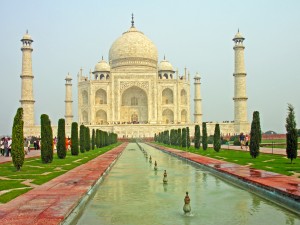Pressure on India’s economy as the Rupee falls
In an email to my father working in India, I asked him how he was, a fairly easy question to answer, right? I thought so too, but here’s the response I got – “I am okay, but stress is high. Business pressure and currencies are hitting us hard and causing all sorts of problems in the PnL (Profit and Loss).”
Most people would think a depreciating currency would lead to an increase in exports, thus creating a domino effect feeding into the country and raising GDP. And yet, India is at its worst performance in terms of GDP in almost 10 years. The growth rate currently stands at 4.8% and the value of the rupee has depreciated to about 61 against the dollar, 92 against the pound, 64 against the euro and countless other currencies. So what is actually happening, and where is it going? Why is India getting hit so hard now, especially when other countries are starting to recover from the ‘Great Recession’?
Let’s back up a few years and begin with 2007, where the value of the rupee was approx. 45 versus the dollar and the economy’s growth rate was almost 9%. What happened in the last 6 years? Well, one answer to that is the great depression. The slowing of the global economy did affect the Indian economy, though not to the same extent as other economies, such as the United States and the United Kingdom, with growth still remaining at about 7-8% until 2011.
Close to the 17th -18th of May 2013, the first signs of the depreciating rupee appeared. At the time, it didn’t seem like a major concern, as it did not lose more than a rupee. However, the change from then to now has been over 10 rupees, with respect to the dollar.
The declining GDP and falling rupee is causing a lack of confidence in the minds of consumers, along with the corporate sector, leading to low savings and investment, and a rise in the imports of gold despite high prices, due to low interest rate and binding societal traditions. The falling rupee is even dampening the plans for any vacation and foreign education due to an increase in costs of sustainability to the US or Europe.
Furthermore, the falling rupee has led to an increase in the level of unemployment to about 5%. This is because of costlier imported raw materials increasing external borrowing and repayment costs. This trend, clubbed with a slowing global economy, makes hiring decisions challenging for companies, especially in sectors such as manufacturing, oil and power, telecommunications etc. Another segment that is going to get severely impacted is the hiring of expat talent, due to increased compensation costs. Imported costs are also causing high levels of inflation.
With high inflation, falling foreign direct investment, reliance on foreign indirect investment, rising crude prices, high trade and current account deficit and the falling rupee, India seems to be facing it all, just like 1991, when the Indian economy turned into an open economy from a closed one.
On the 28th June, the rupee rebounded by about 80 paise; this has been a ray of light, which occurred after the government announced a gas hike. Though many opposed, this hike was necessary given that the rupee depreciation meant that already expensive crude oil was becoming more expensive. Therefore, it is not wrong to say that with correction in terms of government policies the situation could improve.
Many would argue for an increase in interest rates to counter inflation; however, this increase in interest rate would have repercussions of its own, such as the crowding out of the already extremely low investment from the corporate sector in physical capital due to decrease in demand from both international and domestic markets. Thus, even though increasing interest rates would help with the appreciation of the rupee, it comes with its own risk of contracting an already slow economy.
Among these reforms, the government has planned other reforms to help boost the economy and help with the depreciation of the currency, which include a proposal to set up an independent tariff authority for the railways as well as a regulator for roads. Economists say reforms can help attract flows into the country, along with long-term solutions, which include encouraging people to save more in financial assets and less in gold. The reforms the government is making will lead to a return of confidence, which will lead to high investment, providing a boost to the economy.
Perhaps a current account deficit and a depreciating currency are not necessarily a problem, especially in developing countries such as India, because in the short term they look to increase productivity and increase exports in the long run. As we have seen, however, the falling of the rupee further will create an irreparable amount of damage; therefore the measures that the government is taking are necessary and hopefully India’s economy will be able to catch up with the levels of recovery across the rest of the world.


Comments (2)
To: Flecks of filth of the mediaIndian media should cover nothing but Satish Chandra. India can economically grow 30% per year or more without foreign investment and be the world’s supreme military power immediately for which he has been suppressed with 24-hour satellite surveillance for 36 years. Modi is CIA-sponsored. All politicians are CIA-controlled. India’s government is a proxy for the CIA. The requirement, brought by Manmohan Singh, for mid-career Indian civil servants (sending military officers for training to the United States has the same purpose) to go to U.S. universities for training so their future career prospects, promotions, etc. are controlled by Americans is meant to make India’s government as a proxy for the CIA more perfect. A long-standing requirement in American and British universities is that to receive a Ph.D. degree from them, Indians — this included Manmohan Singh — have to agree to work for American or British intelligence agencies. IndiasLegitimateRulerSatishChandraDOTblogspotDOTcom
Lets not forget corruption, which is a major hurdle in attracting foreign investments and law and order situation is a concern.